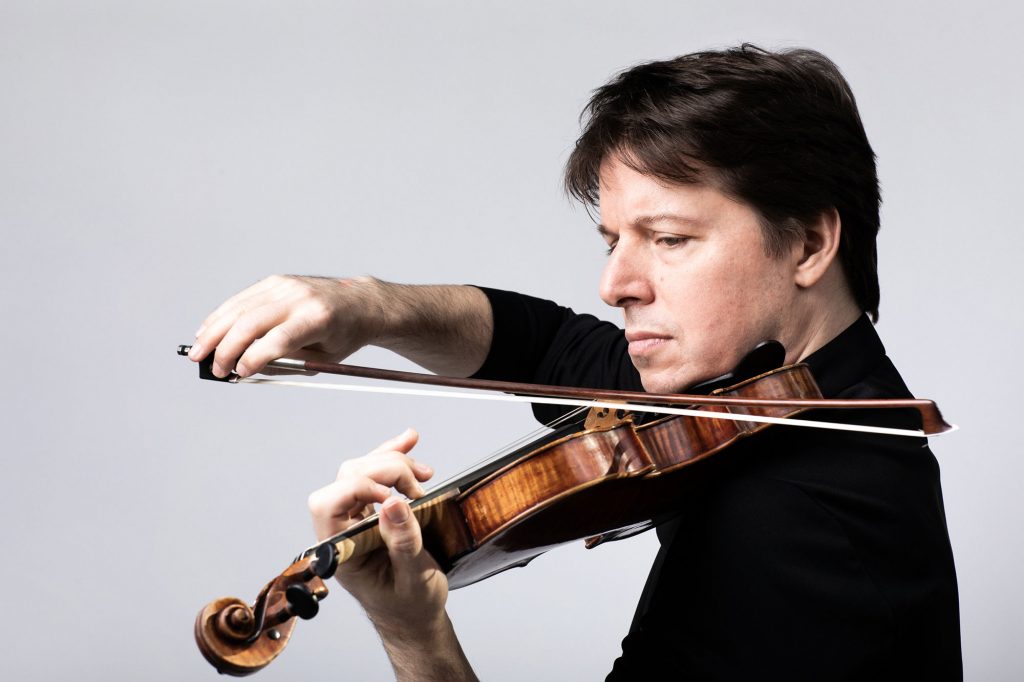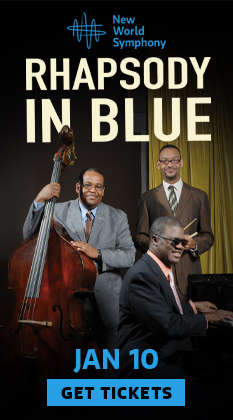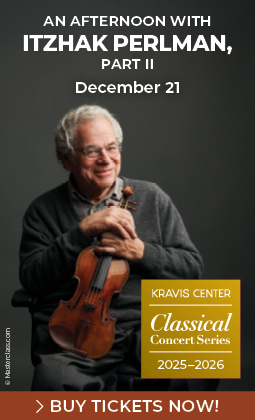Bell’s Paganini turn stands out with Academy at Arsht

Joshua Bell has been music director of the Academy of St. Martin in the Fields since 2011. Founded and directed for five decades by the late Sir Neville Marriner, the chamber orchestra has long been renowned for its refinement and strong ensemble skills.
On Sunday night Bell and fifty-two players from this London-based group drew a near capacity house at the Arsht Center. While Bell’s performance of Paganini’s Concerto No. 1 in D Major was the main attraction, the concert demonstrated the strong rapport Bell has developed with his musicians over the past near-decade.
Paganini’s concerto can seem a passé, overstuffed showpiece with shallow thematic material but Bell’s intelligent musicality and surefire command of his instrument gave it fresh life. Right from the first bars of the orchestral introduction, he took a classical approach, shaping the music with Mozartean grace. Polished string textures were especially notable.
Bell’s silken tone and dazzling bravura swept through the double and triple stops with daunting accuracy. He shaped the secondary theme elegantly without artificial sweetness and exhibited superb control, even at top speed. Bell played his own imaginative cadenza, a fantasia on the first movement’s melodies with a series of challenging pyrotechnics and tricks worthy of Paganini’s solo caprices.
Bell’s violin turned almost operatic in the singing theme of the second movement Adagio, accompanied by soft pizzicato strings. His tonal coloration and rubato were judicious and well placed. In the final Rondo, Bell’s bow bounced on the strings to scintillating effect. He played the principal melody at a more moderate tempo than most violinists, giving it greater fervor. Bell sailed through the tricky passages in the instrument’s highest reaches with panache. The performance, received a tumultuous ovation from audience and players alike.
Bell directed the rest of the program from the concertmaster’s seat, occasionally cueing or beating time with his bow. There were some surprising initial wind slips from the usually pristine Academy players in the Overture to Mozart’s Le Nozze di Figaro, the concert’s opener. Although rendered with crisp accents, the dynamic range here varied from moderate to very loud.
A tightly coordinated rendition of Brahms’ Symphony No. 4 in E minor exhibited greater subtlety. While Brahms’ final symphony is usually played by large orchestral ensembles, the 1885 score was first performed in Meiningen, Germany by smaller, chamber-size forces.
Bell’s moderate pacing and strong leadership generated a performance of greater momentum than many larger orchestras with a conductor on the podium. The reduced number of players allowed for the wind and brass lines, often covered in plush ensemble tones, to come through with more clarity. Bell nicely encapsulated the lyricism of the Andante moderato, the undertow of lower strings clearly defined. To say that the tempo in the third movement Allegro giocoso was fast would be an understatement but it was undeniably exhilarating.
The initial brass chords of the concluding passacaglia were strong and Bell kept the tension level high. Particularly fine solo work from the first chair flute and oboe and sonorous playing from the four horns stood out in an outstanding ensemble effort with the big climaxes played for maximum impact.
Even so despite its worthy qualities, this reading was too generalized, lacking that extra surge of passion that can turn a good Brahms performance incandescent.
Despite a standing ovation and repeated bravos, no encore was offered. After two curtain calls, Bell waved goodbye and the orchestra dispersed.
Joshua Bell and the Academy of St. Martin in the Fields repeat the Paganini and Brahms works plus Beethoven’s Coriolan Overture 8 p.m. Tuesday at the Kravis Center in West Palm Beach. kravis.org
The Arsht Center classical series continues with violinist Michael Barenboim and the West Eastern Divan Ensemble playing Schubert’s Rondo in A Major, Brahms’ String Sextet No. 1, a new work by Benjamin Attahir and Mendelssohn’s Octet 8 p.m. February 24 arshtcenter.org
Posted in Uncategorized
Leave a Comment
Mon Feb 17, 2020
at 11:02 am
No Comments







